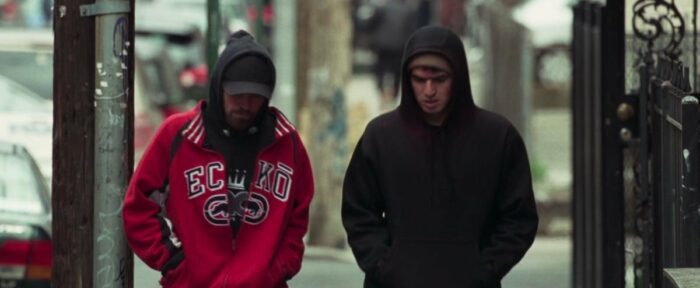Good Time is hard-bitten pulp set inside a pitiless New York miasma. It’s raw. It’s cynical. It, most of all, is relentless. With Good Time, directing brothers Benny and Josh Safdie have given us a heist film for the ages, a ‘70s crime flick updated for the 2010s. Just as films like Taxi Driver, Dog Day Afternoon, and Dirty Harry reflect the anxieties of an America coming out of the counterculture movement when crime rates soared, anti-war sentiment ran deep, and the country searched for a new identity, Good Time works the same way in today’s climate. The Safdies’ film seizes the underbelly of the contemporary American ethos, one that’s greedy, unforgiving, and selfish, during a time when America is seething and once again in search of who it is.
A24’s Good Time opens with Connie, played by a nearly unrecognizable Robert Pattison (of Twilight fame), seizing his developmentally challenged brother Nick (Benny Safdie) from a therapy session. Connie barges in just as Nick is on the verge of a psychological breakthrough. But Connie knows best. At least he believes he does. Here we already see Pattinson’s character for who he is: a haughty master manipulator whose recklessness permeates every intention. Connie totes Nick along to rob a bank. The duo don the masks of black men, which not only calls to an actual string of bank robberies in Ohio, but is indicative of the kind of systemic racism rampant in the U.S. It’s the tired and unfortunate practice of racial scapegoating, dumping one’s inadequacies, failings, and limitations on another people.

The robbery goes exactly as you might imagine it would go today: unromantic, sloppy, and utterly disastrous. Though, surprisingly, everything goes somewhat smoothly; that is, up until soon after making a seemingly clean getaway a dye pack explodes, spoiling the cash and covering the brothers in fluorescent red dye in the middle of the afternoon. When the two are approached by a cop, Nick, terrified and jumpy, bolts. A frenetic chase ensues before Nick crashes through a plate glass window and gets arrested. And so begins Connie’s kinetic odyssey through Queens to bail his brother out of jail. What unfolds is a crucible set to an unforgiving neon glow and a cerebral synth soundtrack.
Connie is a self-righteous weasel. To him, everyone and everything is at his disposal. Even his girlfriend, Corey (Jennifer Jason Leigh), who has her own cocktail of problems and personal demons, is just a resource. Connie believes the world owes him something, and he’s hellbent on cashing in. Yet, the Safdies mean for us to root for the guy. And we do. But, just like Connie, the directing duo are cunning manipulators. Who we’re actually pulling for is Nick, and just by extension do we root for his only ostensible lifeline: Connie. In this way the film taps into an innate human characteristic. More specifically, we would like to think there’s nothing we wouldn’t do to protect the ones we love. Say what you will about Connie’s shortcomings, but his heart is in the right place—sort of.
Just like America, Good Time is predicated on a common through line: money. Not enough, you’ll go nowhere. None and you’re no one. The characters in this film are what happens when human beings are spit out on the other side of a fruitless quest for wealth, their souls in tatters. Cinematographer Sean Price Williams captures this monetary nightmare, using 35mm, with an energetic rawness. It’s like a poem inked with merciless streetlights and a consuming darkness. His prime canvas is Pattinson’s face. It’s one that says so much through even the slightest nuance of his mien. However, the Safdies aren’t afraid to have him pull back the camera, showing us bustling, yet lonely New York City streets, as if to remind us of the helplessness we face in this indifferent universe. During these moments you can imagine thousands of stories going on just like the one unfolding before us.

Good Time never goes where you expect. Its unpredictability rests mostly in Connie’s impetuousness. After a comedy of errors, which doesn’t need unnecessarily spoiled, his fate becomes inextricably linked to a bibulous parolee named Ray (Buddy Duress). Ray clues Connie in on a Sprite bottle filled with thousands of dollars’ worth of LSD that Ray and some hoodlum friends stashed in a funhouse during an acid-fueled run-in with the law. Though, while this seems like a surefire way to make the quick cash he needs to get his brother out of jail, it just compounds his troubles further, which, in all his capriciousness, is all he ever manages to do during his night-long slog through Queens.
For all of Connie’s deficiencies, he walks around with a blue-collar egotism. It’s the same kind that infuses much of our (and the Western world’s) fiery political landscape. “You’re a fuck-up,” Connie says to Ray. “Losers like you are incapable of taking care of themselves. You’re either leeching off mommy or leeching off welfare or living off the government in jail. You serve absolutely no function whatsoever.” Says the guy who robbed a bank and spent the night plundering the goodwill of others. And it’s no mistake that those who Connie takes advantage of look different than him, like when he takes shelter in a Haitian woman’s home, uses her phone, and proceeds to manipulate her impressionable 16-year-old granddaughter, Crystal (Taliah Webster). He, at one point, kisses the child and even piles on delusions of grandeur about some cosmic purpose for them having met. The Safdies could intentionally be commenting on modern-day America. Or they may have just stumbled upon it. Though, it’s probably the former. Nevertheless, the subtext functions like a sucker punch to the jaw.

In David Mamet’s brilliant House of Games, a sly con man named Mike (Joe Mantegna), after putting one over on a marine at a Western Union, says, “Everybody gets something out of every transaction. I give that guy my confidence. I ask him for help, and what he gets is he feels like he’s a good man.” You can draw a straight line from Mike to Connie. They’re both con men. Both see the world as a honey pot with no limitations. Everybody has something to give. The trick is to figure out how to take it. Even better when they can make their prey feel good about it. However, Good Time not only shows the danger inherent in these types–particularly those with nothing to lose and a chip on their shoulder–but it reflects a society grounded in a much more sinister transaction. Why, at one point, do the cops assume a black man on the ground, beaten to a pulp, is guilty while taking Connie’s word as gospel?
The last frame of Connie is the ultimate anti-hero shot. It’s reminiscent of The Graduate’s famous final scene, one that you chew on long after the credits roll. Though, Good Time’s is a little more certain. As the camera focuses on a glassy-eyed Pattinson, for all he has done, you might presume, perhaps, Nick is finally free.

